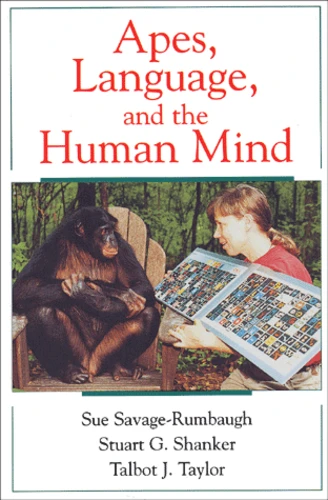Apes, Language And The Human Mind
Par : , ,Formats :
- Paiement en ligne :
- Livraison à domicile ou en point Mondial Relay indisponible
- Retrait Click and Collect en magasin gratuit
- Réservation en ligne avec paiement en magasin :
- Indisponible pour réserver et payer en magasin
- Nombre de pages244
- PrésentationBroché
- Poids0.365 kg
- Dimensions15,0 cm × 23,0 cm × 1,2 cm
- ISBN0-19-514712-X
- EAN9780195147124
- Date de parution28/11/2001
- ÉditeurOxford University Press
Résumé
Current primate research has yielded stunning results that not only threaten our underlying assumptions about the cognitive and communicative abilities of nonhuman primates, but also bring into question what it means to be human. At the forefront of this research, Sue Savage-Rumbaugh recently has achieved a scientific breakthrough of impressive proportions. Her work with Kanzi, a laboratory-reared bonobo, has led to Kanzi's acquisition of linguistic and cognitive skills similar to those of a two and a half year-old human child. Apes, Language, and the Hunan Mind skillfully combines a fascinating narrative of the Kanzi research with incisive critical analysis of the research's broader linguistic, psychological, and anthropological implications. The first part of the book provides a detailed, personal account of Kanzi's infancy, youth, and upbringing, while the second part addresses the theoretical, conceptual, and methodological issues raised by the Kanzi research. The authors discuss the challenge to the foundations of modern cognitive science presented by the Kanzi research: the methods by which we represent and evaluate the abilities of both primates and humans: and the implications which ape language research has for the study of the evolution of human language. Sure to be controversial, this exciting volume offers a radical revision of the sciences of language and mind, and will be important reading for all those working, in the fields of primatology, anthropology, linguistics, philosophy of mind, and cognitive and developmental psychology.
Current primate research has yielded stunning results that not only threaten our underlying assumptions about the cognitive and communicative abilities of nonhuman primates, but also bring into question what it means to be human. At the forefront of this research, Sue Savage-Rumbaugh recently has achieved a scientific breakthrough of impressive proportions. Her work with Kanzi, a laboratory-reared bonobo, has led to Kanzi's acquisition of linguistic and cognitive skills similar to those of a two and a half year-old human child. Apes, Language, and the Hunan Mind skillfully combines a fascinating narrative of the Kanzi research with incisive critical analysis of the research's broader linguistic, psychological, and anthropological implications. The first part of the book provides a detailed, personal account of Kanzi's infancy, youth, and upbringing, while the second part addresses the theoretical, conceptual, and methodological issues raised by the Kanzi research. The authors discuss the challenge to the foundations of modern cognitive science presented by the Kanzi research: the methods by which we represent and evaluate the abilities of both primates and humans: and the implications which ape language research has for the study of the evolution of human language. Sure to be controversial, this exciting volume offers a radical revision of the sciences of language and mind, and will be important reading for all those working, in the fields of primatology, anthropology, linguistics, philosophy of mind, and cognitive and developmental psychology.

